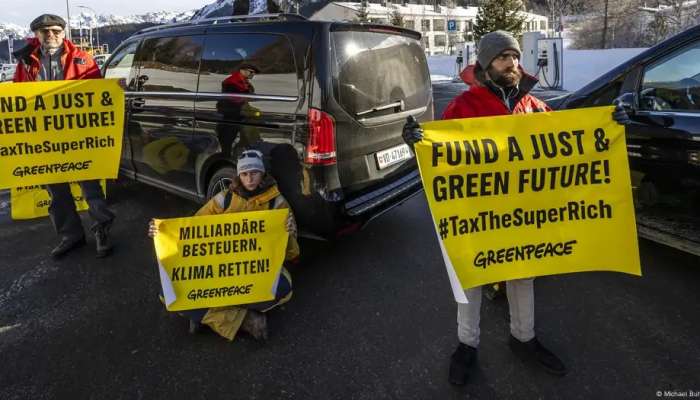
Davos: The protest is small but loud. As limousines drive past, a few hundred young people have gathered on the Postplatz square in Davos, Switzerland.
The high-altitude resort in the Alps that usually belongs to skiers looks different this week. Bakeries, cafes, and boutiques have been converted to host banks, companies, or whole countries for the next few days.
A pub is now called "Belgium House." The old furniture has been cleared out and chic designer furniture and large advertising posters have been put in their place.
The demonstrators outside shout "Eat the rich" and "Tax the rich." Some of them block the street. Their protest is directed at the participants of the World Economic Forum (WEF). They see the meeting, which runs from January 20-24, as a complete waste of money and time.
"We are protesting against the lobby meeting of the rich and powerful in Davos. It is clear that they are the ones responsible for the current crises," says Mirjam Hostetmann from the youth organization Young Socialists Switzerland, which is connected to the Social Democratic Party of Switzerland. The group is helping organise the demonstration under the motto "Strike WEF."
Time to speak openly and plainly
Ines Yabar has a slightly different view of the event.
The young Peruvian was invited as a guest to the World Economic Forum this year. In Lima, she works with others to protect the environment, addresses social problems, and is active as a Global Shaper. This global network of young, committed people between the ages of 20 and 30 is supported by the WEF but organises itself independently.
In Davos, Yabar wants to discuss things with those in power and build bridges, but she also plans to speak plainly. At the same time, she can understand why there are demonstrations outside.
"I feel that this shows that young people care and wherever we can we will be protesting because it is important to raise our voice about issues we are passionate about," says Yabar. "But we will also be in rooms where we can talk with people deliberately and intentionally that are making decisions that affect our future."
Global Shapers and decisions about the future
This year, 50 Global Shapers from around the world will take part in the discussions in Davos.
They will discuss social justice, climate change, artificial intelligence (AI) and many other important topics.
Being present in Davos is an opportunity for many, especially since many young people are dissatisfied. The current situation cannot continue, says Olajumoke Adekeye.
The Nigerian member of the Global Shapers Community is appalled because only 2.8% of the world's parliamentarians are under the age of 30, she says. In sub-Saharan Africa, a large proportion of the population is under 25, but when it comes to decisions that affect their future, they are not heard. And that's why she is here.
Indeed, for the next few days her schedule is full. She will need all her energy to meet her mandate of "seeding ideas about how young people can be empowered to take on greater responsibility."
"Together both the youth within these walls and outside send a strong message that there is really change that can be made," says Adekeye, when asked about being a part of a youth delegation inside the WEF while young people protested outside.